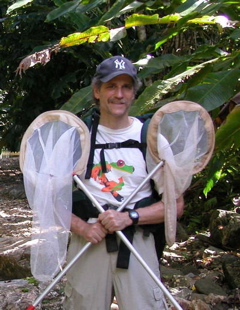Life History Evolution
Reznick, D. N., H. Bryga, and J. Endler. 1990. Experimentally induced life‑history in a natural population. Nature 346:357‑359.
Reznick, D. N., M. J. Butler IV, F. H. Rodd, and P. Ross. 1996. Life history evolution in guppies (Poecilia reticulata). 6. Differential mortality as a mechanism for natural selection. Evolution 50:1651-1660.
Reznick, D. N., F. H. Shaw, F. H. Rodd, and R. G. Shaw. 1997. Evaluation of the rate of evolution in natural populations of guppies (Poecilia reticulata). Science 275:1934-1937.
Reznick, D., M. J. Butler IV, and H. Rodd. 2001. Life history evolution in guppies 7: The comparative ecology of high and low predation environments. American Naturalist 157: 126-140.
Walsh, M. and D. N. Reznick. 2008. Interactions between the direct and indirect effects of predators determine life history evolution in a killifish. PNAS 105: 594-599.
Senescence
Reznick, D. N. 1993. New model systems for studying the evolutionary biology of aging. Genetica 91:79-88.
Reznick, D., C. Ghalambor, and L. Nunney. 2002. The evolution of senescence in fish. Mechanisms of Aging and development 123: 773-789.
Bryant, M.and D. N. Reznick. 2004. Comparative Studies of Senescence in Natural Populations of Guppies. American Naturalist 163: 55-66.
Reznick, D. N., Bryant, M., Roff D. A., Ghalambor, G. and Ghalambor, D. E. 2004. Effects of extrinsic mortality on the evolution of senescence in guppies. Nature 431: 1095-1099.
Reznick, D. N., M. J. Bryant, and D. Holmes. 2006. The evolution of senescence and post- reproductive lifespan in guppies (Poecilia reticulata). PLOS-Biology 4: 136-143.
Evolution of Placentas
Reznick, D. N., M. Mateos, and M. S. Springer. 2002. Independent origins and rapid evolution of the placenta in the fish genus Poeciliopsis. Science 298: 1018-1020.
M. J. O’Neill, B. R. Lawton, M. Mateos, D. M. Liscinsky, G. C. Ferreri, T. Hrbek, R. W. Meredith, D. N. Reznick, R. J. O’Neill. 2008. Ancient and continuing Darwinian selection on Insulin-like growth factor II in placental fishes. PNAS 104: 12104-12109.
Banet, A. I. and D. N. Reznick. 2008. Do Placental Species Abort Offspring? Testing an Assumption of the Trexler-DeAngelis Model. Functional Ecology 22: 323-331.
Conservation Biology
Reznick, D. N. and C. Ghalambor. 2001. The population ecology of contemporary adaptation: What empirical studies reveal about the conditions that promote adaptive evolution. Genetica 112/113: 183-198.
Reznick, D. N., L. Nunney, and H. Rodd. 2004. Empirical evidence for rapid evolution. In Evolutionary Conservation Biology, (D. Couvet, U. Diekman, and R. Ferrier, eds).Cambridge University Press.
Reznick, D. N. and C. Ghalambor. 2005. Can commercial fishing cause evolution? Answers from guppies. Canadian Journal of Fisheries and Aquatic Sciences 62: 791-801.
Reznick, D. N., C. K. Ghalambor, K. Crooks. 2008. Understanding the Evolutionary Consequences of Predator Removal in Natural Communities: Experimental Studies of Evolution in Guppies as a Model System. Molecular Ecology 17: 97-107.
Perspectives and Reviews
Reznick, D. N. 1985. Costs of reproduction: an evaluation of the empirical evidence. Oikos. 44:257‑267.
Reznick, D. N. and J. Travis. 1996. The empirical study of adaptation in natural populations. In: Adaptation, (M. R. Rose and G. V. Lauder, eds.). Academic Press, San Diego, CA, pp. 243-290.
Reznick, D. N., L. Nunney and A. Tessier. 2000. Big houses, big cars, superfleas and the costs of reproduction. Trends in Ecology and Evolution 15: 421-425.
Reznick, D. N. and R. E. Ricklefs. 2009. Darwin’s bridge between microevolution and macroevolution. Nature 457: 837-842.
Upcoming book
Reznick, D. N. 2009. The Origin Then and Now: An Interpretive Guide to the Origin of Species. Princeton University Press. To appear Nov. 2009.
|

